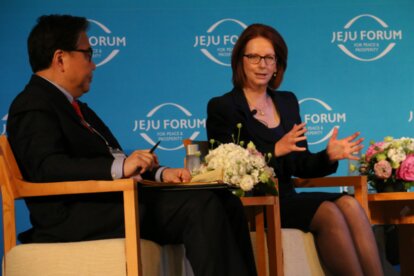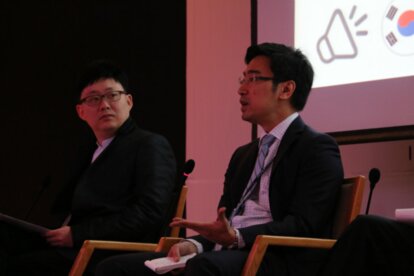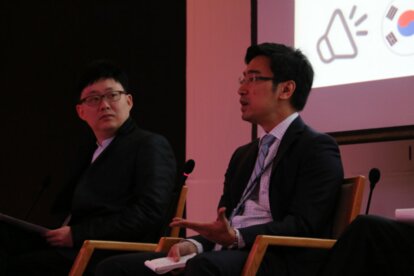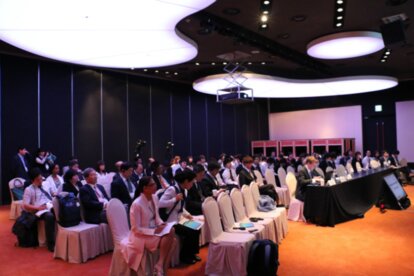Globalization and Inequality

With the success in 2013, EFN Asia and FNF Korea decided to continue to co-host a session in theJeju Forum for Peace and Prosperity 2014 in Jeju island, Korea. The bigumbrella of the whole event is ‘Designing New Asia.’ Our session’s theme is‘Globalization and Inequality.’ With the recent worldwide Piketty phenomenonand inequality situations in many Asian countries, we firmly believe that it isa topic we have to discuss and share our views.
The forum has started in 2001 and continued to attract participantsaround the world. It is expect-ed that this year there were more than 4,000 participants altogether. Huge crowdof people attended two-and-a-half-day-event held during 28-30 May 2014. Notable figures ofthis year include Julia Gillard, former prime minister of Australia, SalamFayyad, former prime minister of state of Palestine, Li Zhaoxing, formerforeign minister of China and Carly Fiorina, former president of Hewlett-Packard.

Coming back to our session, it is undeniable that globalization is one of the most powerful forces to have shaped the post-world war world. Economically speaking, international trades, services and financial flows have become increasingly more and more important. However, its effect has been also one of the most hotly-debated topics, particularly in relation to the poverty and inequality at global and individual scale. Does globalization widens the inequality or helps mitigate the effect?
Ourspeakers include notable experts in various Asian countries, namely Dang HuyDong, deputy minister of planning and investment from Vietnam; Dr SethaputSuthiwart-Narueput, executive chairman of thailand future foundation fromThailand; Choi Byung-il, professor from ewha womans university from Korea; PeterWong, executive director of Lion Rock Institute from Hong Kong and StellaQuimbo, professor from university of the Philippines.Welcoming remarks was given by Rainer Adam, regional director of FNFsoutheast and east asia and congratulatory speech from Rolf Mafael, ambassadorof Germany to Korea. Our rapporteur is the main host of our session,Lars-andre Richter, resident representative of FNF Korea.
Speakers share a lot of thoughts related to the issue and talked about experience in their countries. But briefly speaking, they argue that globalization is an inevitable phenomenon and a good one. It is the one that has helped mitigate the income inequality situation. Income inequality actually comes from not enough globalization and protectionism and monopoly. Thomas Piketty’s idea on global tax of wealth is plainly wrong.

Choi Byung-il explained that the absolute number of the world’s poor hasstopped rising since 1950s and has fallen in recent decades, thanks to therapid growth in emerging economies, most notably China and India. Peopleclimbed their social ladders from the poor to the middle class, and to therich. This process continued to work its way, and helped to diminish inequalityin a national economy. However, he emphasizes that the aim of a society cannotbe equality, and we should not mistake inequality for poverty. Politics shouldnow design a financial system to ensure that an economy does not become hostageto the big financial institution. As witnessed in the 2008 crisis,‘privatization of success, and socialization of failure’ is against marketprinciple.
Sethaputfrom Thailand raised interesting distinction between inequality of income, inequalityof opportunity and inequality of fairness and stress that it is the inequalityof fairness and opportunity that we should address first. He also showedexample of an effect of globalization to protective North and free South Koreaand looked at the obvious result now. What we should do are improvingcompetition in regulated sectors, fighting against corruption, improvingeducation quality and strengthening rule of law.
Peter Wongstarted his argument by asking if inequality is a phenomenon. He then describedthe attempts in the past to eliminate inequality such as the one during Mao inChina. The results are clear. All failed while the world over the past 60 yearshas seen inequality declining. By sharing different experiences of Asiancountries dealing with globalization, our session provided a forum fordiscussions on what role the globalization has played in improving inequalityand poverty in our region. At the same time, it aims to elaborate ondifferent strategic policy options for Asia to become more prosperous in theera of globalization, guarding against protectionist policies often based onpolitical calculation.
